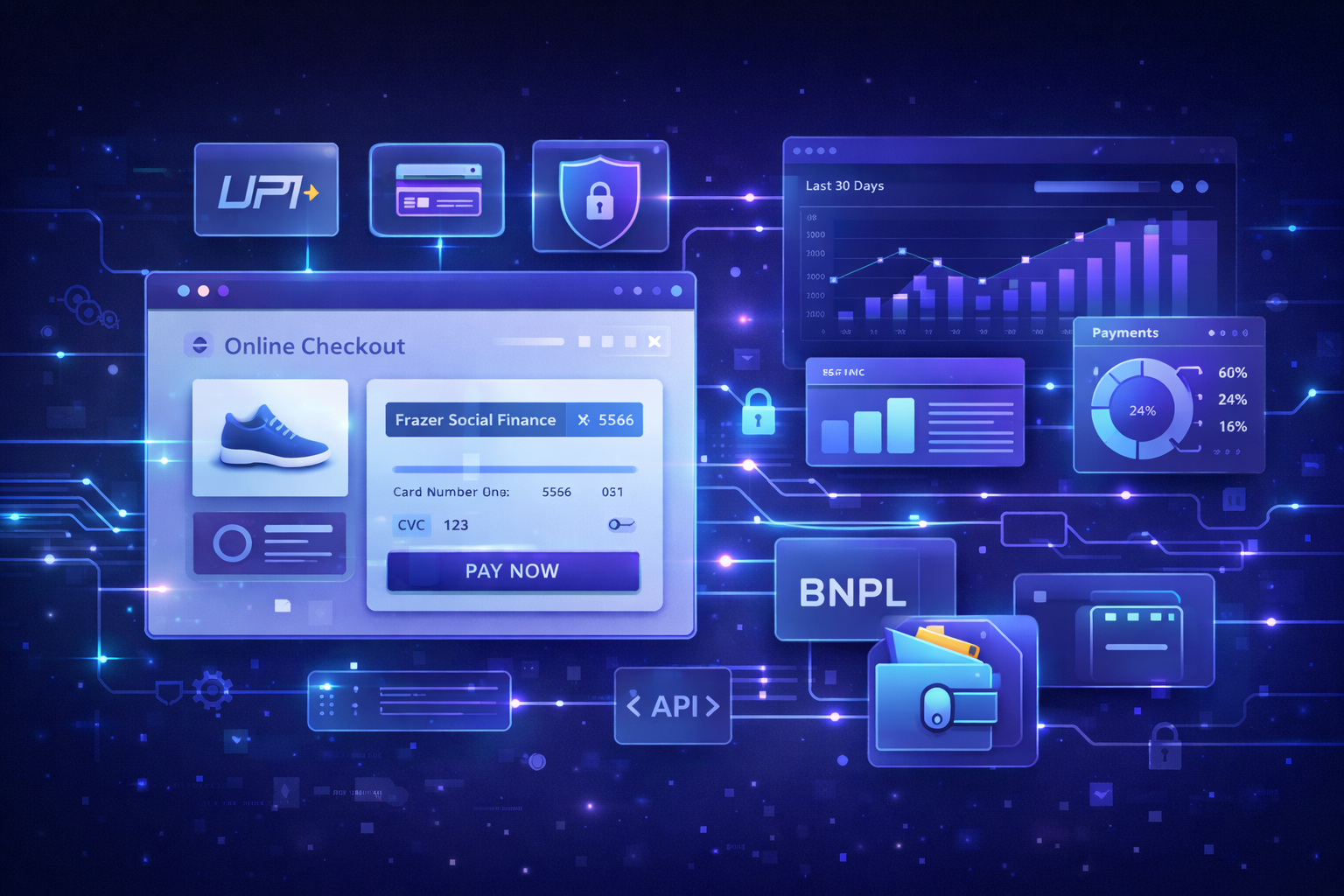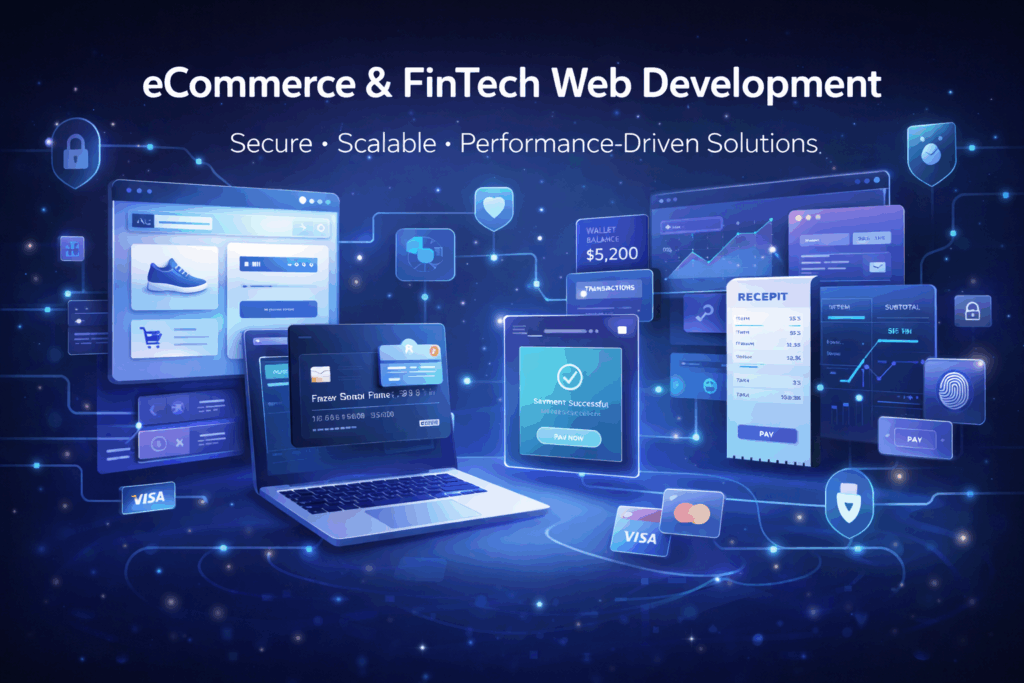Embedded Finance Revolution 2025: How Non-Finance Platforms Are Becoming FinTech Powerhouses
By Shivam Sati · Published on November 1, 2025

Discover how the Embedded Finance Revolution 2025 is empowering eCommerce and digital platforms to become FinTech powerhouses through seamless integrations.
Introduction
The Embedded Finance Revolution 2025 is transforming how digital businesses operate. Non-finance platforms — from eCommerce websites to SaaS portals — are now embedding financial tools directly into their systems. This movement is blurring the line between banking and technology, giving users faster, smarter, and safer financial experiences.
For a web development company like SoftScale, which specializes in eCommerce and FinTech website development, this shift creates massive opportunities to help businesses build fully integrated financial ecosystems within their platforms.

Understanding the Embedded Finance Revolution 2025
Embedded finance means integrating services like payments, insurance, loans, or investments inside non-financial digital platforms. Instead of visiting a separate banking website, users can now complete transactions within the same platform.
Example of Embedded Finance in Action
- Buying a product online with a Buy Now, Pay Later option (BNPL).
- Delivery drivers receiving instant payments via the same app.
- Offering insurance directly at checkout for items like phones or travel.
A detailed explanation of how embedded finance is growing globally can be found in this McKinsey article, which predicts it could exceed $230 billion in revenue by 2025.
Why 2025 Marks a Turning Point for Embedded Finance
Several key forces are driving the Embedded Finance Revolution 2025 into mainstream adoption.
1. Customer-Centric Experiences
Today’s customers demand convenience and speed. Embedded finance allows users to make payments, apply for credit, or insure purchases — all without leaving the platform.
2. API-Driven Technology
FinTech APIs from platforms like Stripe, Plaid, and Razorpay have made it easier than ever to integrate payment or lending systems. As highlighted by TechCrunch, open banking APIs are accelerating the FinTech ecosystem by making secure, real-time connections possible.
3. Data-Driven Personalization
Businesses use analytics to offer personalized financial products such as dynamic BNPL offers or custom credit limits. With responsible use of data, platforms enhance trust and engagement.
4. New Revenue Streams
By embedding finance, non-financial businesses generate additional income through transaction fees or partnership commissions with financial service providers.

How Embedded Finance Is Reshaping eCommerce
The eCommerce industry is one of the biggest beneficiaries of embedded finance. It’s not just about selling products anymore — it’s about creating complete financial ecosystems.
Instant and Secure Payments
Instant payment APIs like RazorpayX and Stripe Connect enable faster checkouts and payouts. According to Forbes, embedded payments are now essential for improving conversions and customer loyalty.
Buy Now, Pay Later (BNPL)
BNPL solutions like Klarna, ZestMoney, and Simpl are integrated directly into eCommerce platforms. This makes expensive purchases accessible, increasing sales by 20–30%.
Our SoftScale eCommerce services include BNPL integration for clients who want to offer this flexible payment method securely.
Embedded Insurance
Adding insurance at checkout (e.g., for mobile devices or travel plans) enhances trust. For example, Allianz Partners provides APIs that make product-specific coverage easy to embed.
Loyalty & Wallet Systems
Integrated digital wallets and loyalty points encourage repeat purchases. These embedded tools turn one-time buyers into long-term customers.
FinTech’s Role in the Embedded Finance Revolution 2025
FinTech companies act as enablers for this revolution by offering the backend infrastructure to connect digital platforms with financial institutions.
Leading FinTech Enablers
- Stripe & Razorpay – Payment APIs
- Plaid & Yodlee – Secure data aggregation
- ZestMoney & LazyPay – Credit and micro-lending
- Allianz Partners – Embedded insurance APIs
These services empower businesses to embed secure, compliant, and high-performance financial solutions into their websites and apps.
If you want to explore how this works technically, SoftScale’s FinTech development team can integrate modern APIs that ensure compliance, encryption, and flawless UX.
Challenges in Implementing Embedded Finance
While the benefits are huge, implementing embedded finance requires precision and trust.
- Regulatory Compliance – Businesses must follow KYC, AML, and GDPR laws.
- Security Concerns – Sensitive data needs encryption and tokenization.
- Complex Integration – Coordinating multiple APIs and systems can be challenging.
- User Trust – Customers need reassurance their money and data are safe.
At SoftScale, our developers follow secure API coding, encryption standards, and financial compliance frameworks to ensure every FinTech feature works safely and efficiently.
Benefits for Businesses Adopting Embedded Finance
- New Revenue Channels: Earn from financial partnerships and transaction fees.
- Improved User Experience: Fewer steps = higher customer satisfaction.
- Better Retention: Users stay longer within platforms that simplify finance.
- Operational Efficiency: Automated transactions save time and reduce errors.
- Competitive Edge: Embedded finance differentiates your platform from others.
The Future of Embedded Finance Beyond 2025
As we move into 2026 and beyond, the Embedded Finance Revolution will evolve even further.
- AI-Driven Insights: Platforms will predict and suggest financial products automatically.
- Voice-Based Transactions: Voice assistants will handle banking and payments.
- Cross-Border Integration: Embedded wallets will simplify international commerce.
- DeFi Integration: Decentralized finance (DeFi) tools will merge with mainstream platforms.
The McKinsey Report emphasizes that businesses embracing this early will dominate the digital economy in the next decade.

Final Thoughts
The Embedded Finance Revolution 2025 is redefining how people and businesses interact with money. It enables non-finance platforms like eCommerce stores, delivery apps, and SaaS tools to act as full-fledged FinTech ecosystems.
If your business wants to build secure, modern, and performance-driven FinTech or eCommerce platforms, partner with SoftScale. Our team specializes in custom development, secure integrations, and scalable web solutions that help businesses grow in the digital era.
Previous Post
Powerful FinTech Website Trends 2025: Why Security, UX, and Speed...
Next Post
Biometric Authentication in FinTech 2025: The Ultimate Revolution in Secure...
Comments (0)
No comments yet. Be the first to share your thoughts.
Related Posts

How FinTech Is Reshaping eCommerce Payments (UPI, Wallets, BNPL & Beyond)
FinTech eCommerce payments are transforming how online businesses handle checkout, security, and customer trust in 2025. The way…

eCommerce and FinTech: How Modern Web Development Powers the Digital Economy
The digital economy is evolving rapidly, with eCommerce and FinTech leading the transformation. Online shopping platforms and financial…

AI Fraud Detection in eCommerce 2025: The Ultimate Shield Against Modern Online Scams
AI Fraud Detection in eCommerce 2025 is transforming online security with real-time risk scoring, behavioral AI, and automated…
